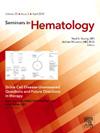Advancements in bispecific antibodies for multiple myeloma: What's new and what lies ahead
IF 4.1
3区 医学
Q1 HEMATOLOGY
引用次数: 0
Abstract
Recent advancements in multiple myeloma (MM) treatment—including immunomodulatory drugs, proteasome inhibitors, monoclonal antibodies, and T cell–redirecting therapies like chimeric antigen receptor (CAR) T cells and bispecific antibodies (BsAbs)—have significantly improved patient outcomes. However, MM remains incurable, highlighting the need for novel therapeutic strategies. BsAbs, which simultaneously target a tumor-specific antigen and CD3 on T cells, have shown promising efficacy. Three BsAbs - teclistamab, elranatamab, and talquetamab - have been approved for relapsed or refractory MM, demonstrating response rates of 60 %-74 % and median progression-free survival of approximately 1 year. This review provides a comprehensive overview of the latest advancements in BsAb therapy for MM, focusing on new therapeutic targets such as BCMA, GPRC5D, and FcRH5, recent clinical trial data, safety considerations, and future directions. We discuss tumor-intrinsic mechanisms of resistance, including antigen expression variability and antigen escape, as well as immune-related factors like T-cell exhaustion and an immunosuppressive microenvironment. Future strategies involve integrating BsAbs earlier in treatment, combining them with other agents to enhance efficacy and overcome resistance, and optimizing administration protocols to mitigate adverse effects. By examining these developments, we highlight how BsAbs are reshaping the treatment landscape of MM and underscore the importance of ongoing research to improve survival and quality of life for patients.
多发性骨髓瘤双特异性抗体的进展:什么是新的,什么是未来。
最近多发性骨髓瘤(MM)治疗的进展-包括免疫调节药物,蛋白酶体抑制剂,单克隆抗体和T细胞重定向疗法,如嵌合抗原受体(CAR) T细胞和双特异性抗体(BsAbs)-显着改善了患者的预后。然而,MM仍然无法治愈,强调需要新的治疗策略。bsab同时靶向T细胞上的肿瘤特异性抗原和CD3,已显示出良好的疗效。三种bsab (teclistamab, elranatamab和talquetamab)已被批准用于治疗复发或难治性MM,其缓解率为60% %- 74% %,中位无进展生存期约为1年。本文综述了BsAb治疗MM的最新进展,重点介绍了BCMA、GPRC5D和FcRH5等新的治疗靶点、近期临床试验数据、安全性考虑和未来发展方向。我们讨论了肿瘤内在的耐药机制,包括抗原表达变异性和抗原逃逸,以及免疫相关因素,如t细胞衰竭和免疫抑制微环境。未来的策略包括在治疗早期整合bsab,与其他药物联合使用以提高疗效并克服耐药性,以及优化给药方案以减轻不良反应。通过研究这些进展,我们强调了bsab如何重塑MM的治疗前景,并强调了正在进行的研究对提高患者的生存率和生活质量的重要性。
本文章由计算机程序翻译,如有差异,请以英文原文为准。
求助全文
约1分钟内获得全文
求助全文
来源期刊

Seminars in hematology
医学-血液学
CiteScore
6.20
自引率
2.80%
发文量
30
审稿时长
35 days
期刊介绍:
Seminars in Hematology aims to present subjects of current importance in clinical hematology, including related areas of oncology, hematopathology, and blood banking. The journal''s unique issue structure allows for a multi-faceted overview of a single topic via a curated selection of review articles, while also offering a variety of articles that present dynamic and front-line material immediately influencing the field. Seminars in Hematology is devoted to making the important and current work accessible, comprehensible, and valuable to the practicing physician, young investigator, clinical practitioners, and internists/paediatricians with strong interests in blood diseases. Seminars in Hematology publishes original research, reviews, short communications and mini- reviews.
 求助内容:
求助内容: 应助结果提醒方式:
应助结果提醒方式:


